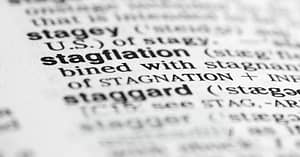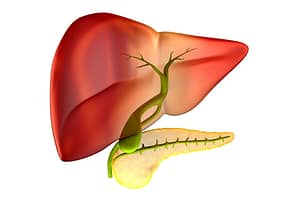
Why do we experience weight gain after Gall Bladder removal?
The gallbladder is responsible for storing bile, a fluid made by the liver. This bile aids in the digestion of fats. If the gallbladder is removed, the body’s ability to store ample bile and digest fats efficiently is reduced.
While some immediate post-surgery side effects like diarrhoea could result in short-term weight loss, in the long run, not having a gallbladder might contribute to an increased BMI.
Is Weight Loss Possible After Gallbladder Removal?
Despite having your gallbladder removed it is possible to lose weight. Individuals who had their gallbladder removed often lose weight naturally. This may be cause of:
Eliminating Fatty Foods
After cholecystectomy, you may experience trouble in digesting fatty foods until your body adjusts. For this reason, your doctor or dietician may instruct you to avoid high fat and fried foods until your body is not ready to tolerate them.
Eating a Balanced Diet
Post gallbladder removal, you may shy away from the food that causes gas and the gastrointestinal upset such as spicy foods.
Having Smaller Portions of Meal
You will not be able to eat large amount of foods in one sitting for a few weeks after the gallbladder surgery. Usually, you will be advised to eat more frequently but in smaller quantities.
Recovery Time
In case of an open surgery, as it takes longer recovery time, pain and discomfort can affect your appetite.
Diarrhoea
One common side effect of gallbladder removal is diarrhoea. During this time, you might be taking in fewer calories which can lead to lose weight, at least temporarily.
How to Lose Weight After Gallbladder Removal?
Some of the most effective ways to lose weight after gallbladder removal are following.
Selection of Diet
You should start paying close attention to your diet. You should control yourself from eating fried foods, processed food and sugary treats. You should start eating more fruits, vegetables and lean meats as these are natural foods that are low on calorie and high on fibre and other nutrients.
You should also avoid intake of junk foods and snack foods and incorporate complex carbohydrates in your diet such as legumes, beans, seeds and brown rice.
Emphasis on Fibre
You should increase your daily fibre intake. It helps in improving digestive process, makes you feel fuller and help you to get through the day without consuming excess calories. It also lowers your cholesterol.
Calorie Control
Loosing weight is simply a matter of consuming fewer calories than you use normally. By doing so, your body starts using your fat as a fuel source resulting in weight loss. Therefore, it is important for you to calculate the number of calories you are consuming per day. You should try to eat at least 200-500 calories less than what your body normally needs.
Exercise/Physical Activity
You should do exercise at least 5 days per week in order to lose weight at a faster rate. Although the rate at which you will lose your weight depends on your current weight, metabolism and other factors.
You should do cardiovascular exercises coupled with weight training for faster weight loss.
You should increase you daily water intake in large amount if you are doing exercise on a daily basis. This not only flushes toxins out from your body but also increases your metabolism which will increase weight loss.
Can Gallbladder Problems Cause You to Gain Weight?
Gallbladder problems and weight go hand in hand, since your body goes into starvation mode to conserve the fat deposited in your body, since fatty foods do not get digested and absorbed due to various problems of the gallbladder dysfunctioning.
Also, after the removal of your gallbladder, weight gain may happen, primarily due to excess fat intake, since earlier one might used to control it in fear of triggering of the symptoms of gallbladder problems. Now they start eating fat without any considerations.
Should People Change Their Diet After Gall Bladder Surgery?
It is not important for some people to have a specific diet after gall bladder removal because gall bladder is not essential for digestion. However, you should eat in a controlled manner in order to avoid any uneasiness. People are generally recommended to have a low-fat diet for several weeks just as precautionary measures but after they can continue having their normal diet.
In some cases, people face some side effects after getting the gall bladder removed, such as bloating, flatulence, indigestion, etc. Under such circumstances, they are advised to make some minor dietary changes such as:
- Avoiding caffeinated drinks like tea and coffee
- Having foods rich in fibre content
- Avoiding fatty foods
- Avoiding spicy foods
To prevent such side effects, you may also consider looking into expert-recommended gut health supplements, as they can help enhance digestion, reduce bloating, and boost your immune system.
FAQs
What Are the Side Effects of Having Your Gallbladder Removed?
Following are some of the side effects that may occur after gall bladder surgery:
Poor digestion
Fever
Jaundice
Flatulence
Bloating
Intestinal Injury
Constipation
How Long Does It Take to Completely Heal From Gallbladder Surgery?
The recovery time varies among people from several days to weeks. People who have undergone laparoscopic procedure for gall bladder removal may feel fewer complications after 2 to 3 weeks of surgery compared to people who have undergone an open surgery.
Can I Lie on My Side After Gallbladder Surgery?
You should avoid lying on your right side where the incisions are present to avoid any pressure on the sensitive area and the associated side-effects. Consider sleeping on your left side, and use a foam knee pillow to avoid the discomfort. It also helps you in straightening your legs, knees, hips while you are sleeping.
How Do You Know if You Have a Bile Leak After Gallbladder Surgery?
Some people may face a complication called bile leak after the surgery in which the bile fluid gets accumulated within the abdomen. This condition has symptoms like belly pain, swollen tummy, fever, sickness, etc. This fluid can be drained out to get the relief from the symptoms.
Can Gallbladders Grow Back?
No, the gallbladders do not grow back once removed surgically. However, after the surgery, a duct or tube like structure is left behind that helps in draining out the bile from liver into the intestines. Sometimes stones are formed in this duct that leads to symptoms similar to the actual gall bladder symptoms.






